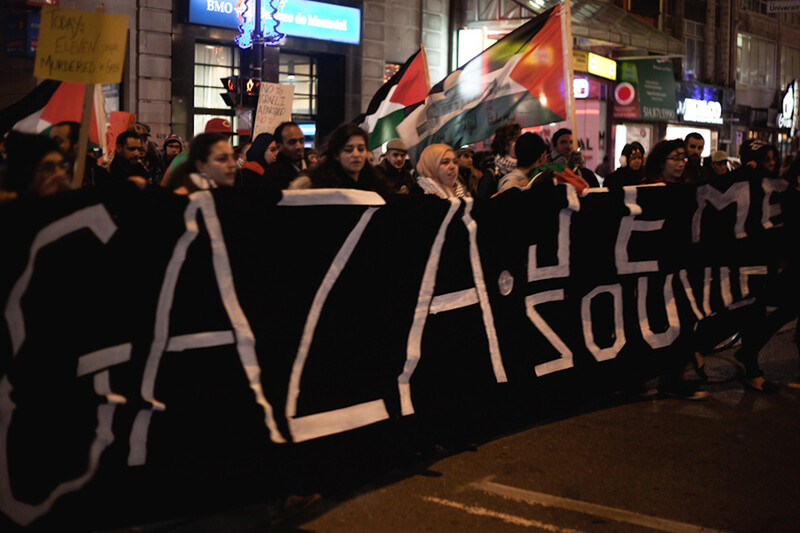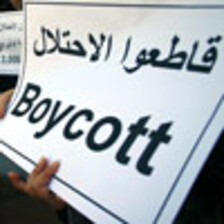The Electronic Intifada Vancouver 7 March 2013

Activists in Montreal protest during Israel’s bombing of Gaza last November.
FlickrA new alliance of on-campus Palestine solidarity groups has been launched in Canada.
The Canadian Student Coalition for Palestine is hoping to build on recent triumphs by the campaign for boycott, divestment and sanctions (BDS) against Israel. Its formation follows votes by seven student unions in Canadian universities — including two campuses in the University of Toronto — to support the BDS call over the past year.
“There are Palestinian solidarity groups across Canadian universities, and though each group is fighting almost identical battles, we are each fighting alone, and now we have the opportunity to come together under a collective coalition,” said Sabrina Azraq, co-president of Toronto Students for Justice in Palestine.
Having launched the alliance at a conference in London, Ontario last month, organizers are already planning a follow-up assembly in Toronto toward the end of the year.
There is a long history of Palestine solidarity activism on Canada’s campuses; in 1999, several student Palestine advocacy groups in Montreal unified to create Solidarity for Palestinian Human Rights. It rose to national prominence in 2002 when protested against a planned visit by Benjamin Netanyahu, then an opposition leader in Israel, to Concordia University in Montreal. Netanyahu’s speech was cancelled as a result (“Discordia: When Netanyahu came to town,” Palestine Solidarity Review, Fall 2004).
“Duty to stand up”
Solidarity for Palestinian Human Rights functioned as a national organization for most of the 2000s, and SPHR chapters have continued to spring up on campuses. However, national coordination of campus Palestine activism has been sporadic, even as the number of groups has grown and their achievements have received national and international attention.
Israeli Apartheid Week, now in its eighth year and marked on hundreds of campuses globally, was launched by the Arab Students Collective at the University of Toronto in 2005.
The success of Students for Justice in Palestine in the United States in coordinating over the past few years was remarked upon by several participants in the recent conference in Ontario. “Students have historically led revolutionary movements in the past. It’s our duty to stand up for human rights … our voices will alter the next generation and hopefully lead to a free Palestine,” said Sahar el-Kotob of SPHR at the University of Western Ontario.
Like their counterparts in the US, student activists in Canada have experienced censorship when seeking to demonstrate solidarity with Palestinians.
Students at McMaster University were prohibited from using the term “Israeli apartheid” in 2008 (“Fact sheet related to “Israeli apartheid” ban,” Window Into Palestine, 25 February 2008.)
Additionally, students at the University of Western Ontario were banned from holding events for a year after displaying a map of historic Palestine as part of a 2005 protest against Israel’s wall in the West Bank (“SPHR banned from atrium,” The Gazette, 8 November 2005).
And Jenny Peto, a post-graduate researcher at the University of Toronto, has been attacked by members of parliament and national newspapers for her critical scholarship and activism (“When neo-con politicians, media attack academics,” Rabble, 26 January 2011).
“Stigmatized”
“Palestinian activists do feel silenced on campus. We feel like our hands are tied and we are stigmatized due to our political stance,” said el-Kotob.
But some students believe that the the recent BDS victories are helping them challenge the landscape of repression. “Students are winning the battle against repression and silencing on campus,” said Tristan Laing from the University of Toronto. “Even the mayor of New York told pro-Israeli supporters trying to shut down a BDS event to ‘shut up.’ However, an issue less discussed is the silencing specifically of Arab and Muslim groups who are particular targets for normalization, and particularly vulnerable to repression and silencing because of racism and Islamophobia.”
Repression on campus is reinforced by the position of Stephen Harper’s federal government. Jason Kenney, Harper’s minister of citizenship, immigration and multiculturalism, has repeatedly attacked Israeli Apartheid Week, alleging this month that it was “toxic” and at odds with Canadian values of “tolerance, mutual respect and understanding” (“Minister Kenney issues statement regarding Israel Apartheid Week,” Citizenship and Immigration Canada, 4 March 2013).
Saying “no”
“We have to take the issue back … to say, no, Canadians do not support illegal detention, occupation, apartheid. Canadians say no, even if our officials won’t speak for us,” said Nusaiba al-Azem of Solidarity for Palestinian Human Rights at the University of Western Ontario.
Student organizers also drew attention to the growing Idle No More movement, which binds together indigenous people across Canada. A number of Palestine solidarity groups have expressed their support for this movement.
Haneen Karajah of Solidarity for Palestinian Human Rights at the University of British Columbia said, “We need to work on cross-movement solidarity. It’s very important for us to connect with indigenous movements, because we relate to each other on more than one level. As Palestinians living here, it’s very important to work with and support indigenous communities to reconcile the fact that we are also settlers here on their land.”
Charlotte Kates is a social justice and Palestine solidarity activist, based in Vancouver, on unceded Coast Salish Territories. She serves on the organizing committee of the US Campaign for the Academic and Cultural Boycott of Israel and writes about justice, Palestine, prisoners and international solidarity.




